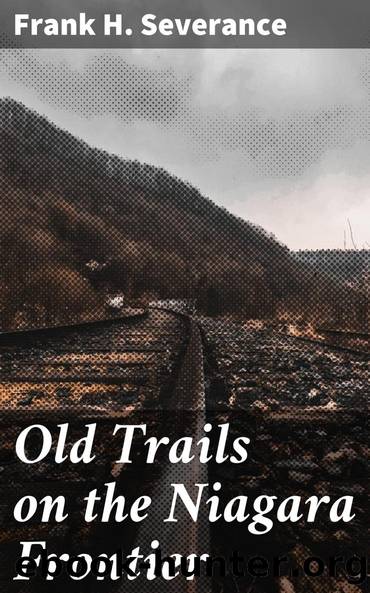Old Trails on the Niagara Frontier by Frank H. Severance

Author:Frank H. Severance [Severance, Frank H.]
Language: eng
Format: epub
ISBN: 9798771637020
Google: pja_zgEACAAJ
Publisher: Independently Published
Published: 2021-11-22T00:50:44+00:00
I have been much too long in getting Mr. Lay to London, to go about much with him there. And yet the temptation is great, for to an American of Mr. Lay's intelligence and inquiring mind the great city was beyond doubt the most diverting spot on earth. One of the first sights he sawâa May-day procession of chimney-sweeps, their clothes covered with gilt paperâbelonged more to the seventeenth century than to the nineteenth. Peel and Wilberforce, Brougham and Lord Gower, were celebrities whom he lost no time in seeing. On the Thames he saw the grand annual rowing match for the Othello wherry prize, given by Edmund Kean in commemoration of Garrick's last public appearance on June 10, 1776. Mr. Lay's description of the race, and of Kean himself, who "witnessed the whole in an eight-oared cutter," is full of color and appreciative spirit. He saw a man brought before the Lord Mayor who "on a wager had eaten two pounds of candles and drank seven glasses of rum," and who at another time had eaten at one meal "nine pounds of ox hearts and taken drink proportionately"; and he went to Bartholomew's Fair, that most audacious of English orgies, against which even the public sentiment of that loose day was beginning to protest. As American visitors at Quebec feel to-day a flush of patriotic resentment when the orderly in the citadel shows them the little cannon captured at Bunker Hill, so our loyal friend, with more interest than pleasure, saw in the chapel at Whitehall, "on each side and over the altar eight or ten eagles, taken from the French, and flags of different nations; the eagle of the United States is among them, two taken at New Orleans, one at Fort Niagara, one at Queenston, and three at Detroit"; but like the American at Quebec, who, the familiar story has it, on being taunted with the captured Bunker Hill trophy, promptly replied, "Yes, you got the cannon, but we kept the hill," Mr. Lay, we may be sure, found consolation in the thought that though we lost a few eagle-crested standards, we kept the Bird o' Freedom's nest.
On July 5, 1823, he crossed London Bridge on foot, and set out on an exploration of rural England; tourings in which I can not take space to follow him. When he first went abroad he had contemplated a trip on the continent. This, however, he found it advisable to abandon, and on October 5, 1823, on board the Galatea, he was beating down the channel, bound for Boston. The journey homeward was full of grim adventure. A tempest attended them across the Atlantic. In one night of terror, "which I can never forget," he writes, "the ship went twice entirely around the compass, and in very short space, with continual seas breaking over her." The sailors mutinied and tried to throw the first mate into the sea. Swords, pistols and muskets were made ready by the captain. Mr. Lay armed himself and helped put down the rebellion.
Download
This site does not store any files on its server. We only index and link to content provided by other sites. Please contact the content providers to delete copyright contents if any and email us, we'll remove relevant links or contents immediately.
The Evolution of an Empire: A Brief Historical Sketch of France by Mary Platt Parmele(444)
An Introduction to the Philosophy of Law by Unknown(344)
Astounding Stories, August, 1931 by Various Authors(333)
BY Arthur H. Smith, Smith A.H. by Village life in china(330)
B-12's Moon Glow by Charles A. Stearns(328)
Historia Amoris by Edgar Saltus(319)
Arsene Lupin vs. Herlock Sholmes by Maurice Leblanc(315)
The story of Sigurd the Volsung and the fall of the Niblungs by William Morris by Unknown(307)
The Fade Tabletop by Jeremy Harris(302)
The Scottish Fairy Book by Elizabeth W. (Elizabeth Wilson) Grierson(287)
The Courtship of Morrice Buckler by A. E. W. Mason(278)
The moral and intellectual diversity of races, with particular reference to their respective influence in the civil and political history of mankind from the French by Count A. De by Gobineau Arthur comte de(270)
Cozy Up for Christmas by Jenny Holiday(265)
Memoirs of a Veteran: Personal Incidents, Experiences and Observations by Isaac Hermann(262)
A History of Witchcraft in England from 1558 to 1718 by Wallace Notestein(258)
Cottage Economy, to Which is Added The Poor Man's Friend by William Cobbett(252)
Euthenics, the science of controllable environment by Ellen H. (Ellen Henrietta) Richards(249)
Folk-Tales of the Khasis by Mrs. Rafy(249)
The Black Douglas by S. R. Crockett(243)
